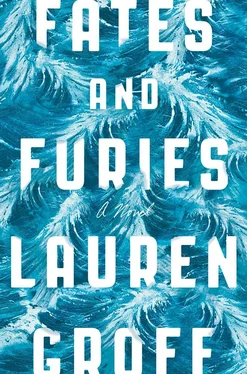“Well. Yeah,” Rachel said. “The play is all about family, how you pass things down from one generation to another, how when you’re born, you belong to a certain patch of family land. It was just obvious. Plus, Dorothy is pregnant. And Julie has a baby upstairs. And even Hoover carries his baby around on his chest. That’s not what you meant?”
“Nope,” Mathilde said, laughing.
Lotto shrugged. “Maybe,” he said.
ELEANOR OF AQUITAINE, 2006
A small man came rushing into the black box at the VIP reception. His sparse hair was white. He wore a faded green cloak and looked, flapping up, like a luna moth. “Oh, my dear boy, oh, my dear, dear Lotto, you have done it, you’ve done what I always knew you would do. You have it in your blood, the theater. Tonight, Thalia kisses your cheeks.”
Lancelot smiled at the little man aping Thalia, kissing his cheeks. He took a glass of champagne from a passing tray. “Thank you so very much. I love Eleanor of Aquitaine. She was a genius, the mother of modern poetry. Now, forgive me, I know that we know each other, but tell me how, exactly?”
Lotto smiled, never taking his eyes off the little man, who drew his head back quickly and blinked. “Oh. Dear boy. I apologize. I have followed your career, you see, with such delight and knew you so well through your plays that I thought, of course, you knew me in return. The old authorial fallacy. I’m mortified. I’m your old teacher at prep school. Denton Thrasher. Does that ring a”—he took a breath, let it out theatrically—“does that ring a bell?”
“I’m so sorry, Mr. Thrasher,” Lancelot said. “I don’t recall. Losing my memory. But thank you ever so much for coming back here and reminding me.”
He smiled down at the little man.
“You don’t,” the man said, his voice faltering; then he blushed and seemed to fade where he stood.
Mathilde, who had been at her husband’s side this whole time, wondered. His memory was as sharp as a diamondcutter. He never forgot a face. He could act out a play verbatim, having seen it only twice. She watched him turn and meet a legendary musical star with a kiss on her hand and saw, past the charm and the easy laughter, a prickly energy. Denton Thrasher walked away. She put a hand on her husband’s arm. When the musical star moved on, Lotto turned to her and silently docked his head on her shoulder for two moments. Recharged, he turned to face the others.
WALLS, CEILING, FLOOR, 2008
“ Walls, Ceiling, Floor? ” the producer said. He was a gentle, sleepy-eyed man who hid a ferocious heart in the flesh of his chest.
“First part of a trilogy of the dispossessed,” Lotto said. “Same family, different main characters. They lose the family house. It’s where they store everything. History, furniture, ghosts. A tragedy. All three would, we hope, play concurrently.”
“Concurrently. Christ. Ambitious,” the producer said. “Which part of the trilogy is this?”
“The mental-health part,” Lotto said.
LAST SIP, 2008
“ Last Sip , let me guess,” the producer said. “Alcoholism.”
“Foreclosure,” Lotto said. “And the last, Grace , is the story of an Afghanistan veteran who comes home.”
GRACE, 2008
“A war story called Grace ?” the producer said.
“I embedded with the Marine Corps in Afghanistan,” Lotto said. “Two weeks, but every moment I thought I was about to die. And every moment I didn’t, I felt blessed. Even if I left religion as a kid. Believe it or not, the title fits.”
“You’re killing me.” The producer closed his eyes. When he opened them, he said, “Fine. If I read them and love them, we’ll do it. I’m bats for The Springs. And Grimoire. I think you have something interesting in your brain.”
“Deal,” Mathilde said from the kitchen, arranging fresh-baked speculoos on a plate.
“ But only off-off-Broadway,” he said. “Maybe in New Jersey somewhere.”
“For the first run,” Mathilde said, setting the tray of cookies and tea on the table. The producer laughed, but nobody else did.
“You’re serious,” he said.
“Read it. You’ll see,” Mathilde said.
—
ONE WEEK LATER, the producer called. Mathilde answered the phone.
“I see,” the producer said.
“I thought you would,” Mathilde said. “Most people eventually do.”
“Did you?” the producer said. “He’s so clownish on the surface. All joke and dazzle. How in the world could you have seen it?”
“But I did. The moment I met him,” she said. “A fucking supernova. Every day since.” She thought but did not say almost .
—
AFTER SHE HUNG UP with the producer, she came to Lotto over the veranda of their new house in the country [still a disaster of siding and drywall; but she had known there was something beautiful — fieldstone, ancient beams — under the mess]. There was a cherry orchard in the front, a perfect flat space for a pool in the back. She had quit her job months ago, had taken over the business side of his. They kept the one-bedroom as a pied-à-terre in the city; she would make this house perfect for them. Life was rich with possibility. Or life was possibly rich; soon, perhaps, she wouldn’t have to worry about phone bills, juggling this credit card to pay off the next. She felt incandescent with the news.
Cold sun, jack-in-the-pulpits nosing out of the still-frozen mud. Lotto lay watching the world incrementally wake up. They had been married for seventeen years; she lived in the deepest room in his heart. And sometimes that meant that wife occurred to him before Mathilde , helpmeet before herself. Abstraction of her before the visceral being. But not now. When she came across the veranda, he saw Mathilde all of a sudden. The dark whip at the center of her. How, so gently, she flicked it and kept him spinning.
She put her cold hand on his stomach, which he was sunning to banish the winter’s white.
“Vain,” she said.
“An actor in a playwright’s hide,” he said sadly. “I’ll never not be vain.”
“Oh, well. It’s you,” she said. “You’re desperate for the love of strangers. To be seen.”
“You see me,” he said, and he heard the echo with his thoughts a minute before and was pleased.
“I do,” she said.
“Now. Please. Talk,” he said.
She stretched her long arms over her head, and there were little nests of winter hair in the pits. She could hatch baby robins in those things. She looked at him, savoring her own knowing, his unknowing. She put her arms down with a sigh, and said, “Do you want to hear?” And he said, “Oh my goodness, M., you are absolutely killing me.” And she said, “It’s a go. All three.” And he laughed and took her hand, callused from house demolition, and kissed it, bitten fingernail to bitten finger, up the arm, the neck. Hefted her over his shoulder and pinwheeled her until the ground heaved, and then, because the air was bright and the birds were watching, he kissed a long trail down her stomach, and he shucked her right there.
AFTER THE INCOMPREHENSION and the raw fish came the long flight, then the short. At last, home. He sat, watching through the window as the staircase approached the plane over the sun-shot asphalt. Spring rain had blown through as they taxied in and just as swiftly was gone. He wanted his face in Mathilde’s neck, the soothe of her hair. Two weeks as playwright-in-residence in Osaka and as long as he’d ever been away from his wife. Too much. He’d woken up to the absence of Mathilde in his bed and felt grief in the coolness where her heat should have been.
The rolling staircase fumbled and missed the door three times before it clicked in. Eager as a virgin. How lovely to stretch this long body of his, to stand and breathe for a few moments at the top of the stairs, savoring the oil and manure and ozone smell of the little Albany airport, sun on his cheeks, wife inside the building waiting to take him to the pretty house in the country, his early dinner. The luxuriant fatigue in his bones chased by cold prosecco then hot shower then smooth Mathilde-skin then sleep.
Читать дальше












